By Paul A. Tenkotte, PhD
Thomas More University
Part 68 of our series, “Retrospect and Vista II”: Thomas More College/University, 1971-2021
After World War II, the Cold War—between the United States and its allies, and the Soviet Union and its satellite states — largely defined the international community. Then, in 1989, communism quickly began to crumble in Eastern and Central Europe. Beginning in Poland, Hungary, Czechoslovakia, Romania, and Yugoslavia, and spreading to Eastern Germany and finally the Soviet Union itself, by 1992 the Cold War was ended.

Paul Tenkotte and Mary S. Campbell. (Courtesy of Paul A. Tenkotte, PhD.)
Sr. Mary Philip Trauth, SND, a specialist in German and Russian history, was ecstatic with the new world order. Under her guidance as chair of the Department of History, she had begun the first self-initiated majors in International Studies. One of the early graduates was N. Aleene Kramer, Class of 1990. In addition, the college hired Mary S. Campbell in 1989 as Director of International Services, overseeing the complex Immigration and Naturalization Service (INS) regulations necessary to enable international students and faculty to study and teach at Thomas More.
In 1990, with an entire new international order being unveiled, Dr. Charles Bensman, president of Thomas More College, asked Dr. Paul A. Tenkotte (then Assistant Professor of History), to examine internationalization for the college. On October 31, 1990, the International Studies Committee, an ad hoc group originating from and reporting directly to the college president, met for the first time. The charter members were Dr. Raymond G. Hebert (ex officio), Dr. Paul Tenkotte (History), Fr. William Cleves (Philosophy), Peter Thornton (Business), David Agee (Development), Fr. Gerald Twaddell (Philosophy/Languages), Sr. Emerita McGann (Languages), Dr. Dale Myers (Associate Vice President, Academic Affairs), Steve Holler (Campus Ministry/Theology), Mary Campbell (Director of International Services), Matt Birkenhauer (Student Support Services), Lois Shannon (English), Shawn Dansby (student), Eileen Maher (student), and Bob Goebel (student). The committee met throughout Fall 1990 and Spring 1991, while Dr. Tenkotte and Mrs. Mary S. Campbell began a systematic study of international programs at area colleges, universities, and community organizations.
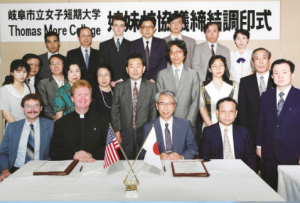
Dr. Tenkotte and Fr. Cleves visited Gifu, Japan in August 1993 for the official signing of the agreement between the two colleges. Seated to the left of the US flag is Tenkotte and Cleves. To the immediate right of the Japanese flag is the president of Gifu City Women’s College, Dr. Kazuo Kitamura. (TMU Archives)
The results were presented in a report entitled, “A Proposal to Inaugurate a B.A. in International Studies and an A.A. in International Studies” (October 27, 1991; Revised November 20, 1991). Effective June 1, 1991, Dr. Tenkotte was appointed part-time Director of International Studies, in addition to his regular teaching responsibilities.
International Studies degrees
On February 21, 1992, Tenkotte presented the first reading of the proposal for the inauguration of an International Studies degree program to the Faculty General Assembly (FGA). On March 13, 1992, FGA held the second reading. The results of the subsequent mail ballots, returned by March 18, 1992, showed that the program was approved 38 to 9. The first Thomas More students enrolled in the program in Fall 1992.
Study Abroad
In addition to creating BA and AA interdisciplinary degrees in International Studies, the program worked to enhance international opportunities at Thomas More. That included the creation of the college’s first concerted attempt to increase study-abroad opportunities for its students. Dr. Raymond G. Hebert coordinated efforts with the Cooperative Center for Study Abroad (CCSA), serving on its Board of Directors for more than thirty years. Under Hebert’s leadership, dozens of Thomas More faculty and hundreds of students studied abroad in CCIA programs that generally ranged from two to eight weeks in length. In addition, Hebert established the college’s relationship with the Kentucky Institute for International Studies (KIIS).
In May 2000, Dr. James Camp and Dr. Tenkotte led the college’s first “alternative Spring-Break” study-abroad program, whereby students engaged in service learning to help poor migrants in Juarez, Mexico. Dr. Steve Holler, professor of Philosophy and Theology, was one of the visionaries of the program, helping to establish connections with the University of Texas at El Paso (UTEP) and their border studies program. Meanwhile, Tom Gilday, a professor of Accounting, established an end-of-the-academic year service learning program in Jamaica.
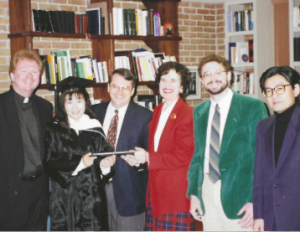
The first student of Gifu City Women’s College to complete her third and fourth years at Thomas More was Hozuki Uemura, who graduated from TMC in December 1995. Left to right: Fr. William Cleves; Hozuki Uemura; Dr. Raymond Hebert; Mrs. Mary Campbell; Dr. Paul Tenkotte; Professor Kenichi Yamamoto (exchange professor from Gifu City Women’s College). (Courtesy of Paul A. Tenkotte, PhD.
Sister Universities
Further, the college established active sister-college arrangements internationally to enable Thomas More students to study abroad for a semester or a single year, as well as for international students to study at Thomas More:
• Gifu City Women’s College, Gifu, Japan: The final draft of an articulation agreement with this two-year women’s college was dated April 29, 1993. Signed by Thomas More College officials, two copies were then mailed to Gifu City Women’s College. On May 13, 1993, officials of Gifu City Women’s College sent a fax (facsimile) to Thomas More stating that they had received both copies of the agreement, and would return a signed copy to Thomas More for our files. On May 27, 1993, they faxed Thomas More with the news that the articulation agreement had been formally signed, enabling graduates of Gifu to continue their third and fourth year of studies at Thomas More College. In Summer 1993, TMC president, Fr. William Cleves, and Dr. Tenkotte made an official visit to Gifu City Women’s College. The first exchange students received were: Hozuki Uemura (graduated from TMC in December 1995); Hiroko Takagi (TMC, May 1996); and Aiko Ando (TMC, May 1997). A faculty exchange was organized in the 1995–1996 academic year, when Professor Kenichi Yamamoto served as Visiting Professor of Japanese at Thomas More. In turn, Thomas More sent Jay Plogman, a TMC English/Art graduate, to Gifu City Women’s College as an instructor of English.
• St. Andrew’s College, Bearsden, Scotland: This sister university, essentially a teacher-training college, was established by Thomas More College’s Education Department.

Benefactors Mrs. Helen Theissen (left) and Miss Rosemary McNeeve (right) of Covington, with Fr. William Cleves.
• Katholische Universitat Eichstatt (Catholic University of Eichstatt), Eichstatt, Germany: In September 1994, Dr. Tenkotte traveled to Germany and arranged this sister-university, on behalf of Thomas More College and Xavier University in Cincinnati. The meeting was arranged by Ute Papke, President of Cincinnati-Munich Sister Cities Association. Tenkotte was assisted in his efforts by Thomas More College alumnus, Robert Stevie. Thomas More accepted its first exchange student from Eichstatt during the academic year 1995–1996, Kerstin Endres. Markus Steiner (1996–1997), Claudia Konig (1997–1998); and Frank Linkesch (1998–1999) followed.
• Mary Immaculate College, Limerick, Ireland: Dr. Tenkotte and Campbell chose this college because of its connection to the Sisters of Mercy of Kinsale, Ireland, which had been brought to nineteenth-century Cincinnati by the great Catholic convert, Sarah Worthington King Peter. In June 1996, Tom McGovern, a Thomas More alumnus and president of the Fenian Division of the Ancient Order of Hibernians, visited Mary Immaculate College. His visit was followed by those of Dr. Beth Penn (faculty, Education Department) and Charlotte Laird (Director of Personnel) in March 1997, as well as by Fenian Division member Kevin McHugh in July 1997, and Dr. Raymond G. Hebert (Vice President for Academic Affairs) in August 1998. This sister-university relationship officially began in Spring 1998, when two Thomas More students, Jaime Calhoun and Cara Gilday, enrolled for one semester at Mary Immaculate. During the academic year 1998–1999, Thomas More accepted an exchange student from Mary Immaculate, Clare Moroney. In October 1998, Mary Immaculate and Thomas More College agreed to double the number of exchange students, beginning in Fall 1999. Funding for the program was largely provided by two benefactors, Mrs. Helen Theissen and Miss Rosemary McNeeve of Covington.
• Universidad del Sagrado Corazon (Sacred Heart University), San Juan, Puerto Rico: This relationship was developed by Dr. Maria (Cari) Garriga. The International Studies worked closely with Dr. Garriga, who became an assistant professor in 1997, following the Faculty General Assembly’s 1996 approval of the Foreign Language department’s proposal for a new degree program in Spanish.
Fund-Raising
In an effort to fund these and many other new international initiatives, Tenkotte and others pursued grants and gifts from foundations and individuals. In the period 1990–1998, total fund-raising by the International Studies program amounted to over $1.2 million in grants and donations. The largest of these included $585,000 from the James Graham Brown Foundation of Louisville as seed money to provide an endowment for Thomas More students to travel and study abroad. Significant funds were also received from the Japan Foundation, Star-Kist/Heinz, Klockner Desma Inc., Bess Robinson, Mrs. Mark (Helen) Theissen, Rosemary McNeeve, and others.
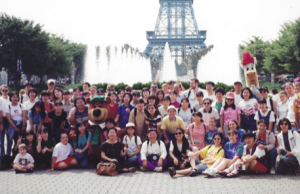
1996 Summer English Language Program, on a visit to Kings Island Amusement Park in Ohio. (TMU Archives)
English as a Second Language
For ten years, one of the largest summer English as a Second Language (ESL) programs in the Cincinnati/Northern Kentucky metropolitan region was held at Thomas More College, under the directorship of Tenkotte. The program began in summer 1991. It largely featured ESL students from the college’s sister-college, Gifu City Women’s College in Japan, as well as high school students from Germany (accompanied by their principal, Sr. Mary Bernarde Derichsweiler, SND, who had spent a sabbatical in 1990–1991 teaching German at Thomas More), and teachers from Taipei, Taiwan.
For years, the three-week Summer English Language Program, which featured dormitory accommodations, three meals daily, English classes and many regional tours and activities, thrived because of a vast network of engaged students, faculty, and staff. Each year, some of Thomas More’s brightest and most extroverted students accepted positions as assistants in the program, living in the dormitories with the ESL students. In addition, volunteers from the region hosted ESL students in their homes during one weekend of the program.
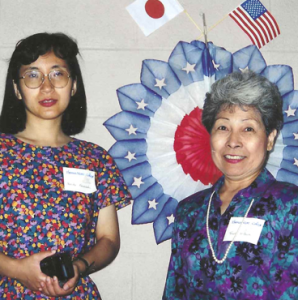
Professor Noriko Kawasaki (Gifu City Women’s College) and Teruko McGuire. (Courtesy of Paul A. Tenkotte, PhD)
One of the program’s stellar volunteers was Teruko McGuire. Terry, as she preferred to be called, was born in Japan but immigrated to the United States in 1961. She worked full time for many years at the Internal Revenue Service Center in Covington. After retirement, she began teaching Japanese to Americans, including students at Thomas More College. She accompanied the Gifu students each day during the summer programs, helping them with their English and to acclimate themselves to the many new cultural challenges they encountered.
A long-time volunteer, and then employee, was David (Dave) J. Ebacher, a 1993 graduate of the history program at Thomas More (and later, an MA in Theology from Xavier University in Cincinnati). Each summer, beginning in 1992, Dave would take time away from his job to work the three-week program. He was beloved by students, faculty and staff alike.
For a short time in the late 1990s, Thomas More also offered an academic year English as a Second Language Program. It was discontinued, however, due to costs.
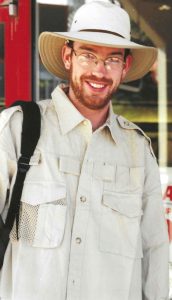
David J. Ebacher. (Courtesy of Paul A. Tenkotte, PhD)
Twenty-First Century
The turn of the 21st Century brought new changes to Thomas More. In May 2000, Mary Campbell announced her retirement. Effective June 1, 2001, after exactly ten years as Director of International Studies, Tenkotte returned to full-time teaching. “While I cherished my time as Director,” Tenkotte stated in the college’s Global Perspectives newsletter, “I truly miss teaching, research and writing . . .” (Global Perspectives, Issue No. 4, 2000–2001 edition, p. 1, TMU Archives). During Tenkotte’s directorship, the “number of Thomas More faculty, staff, students and alumni studying abroad burgeoned, increasing 1,243% from 1992-1993 to 2000–2001 (Global Perspectives, Issue No. 4, 2000–2001 edition, p. 14, TMU Archives).
In June 2001, as both Dr. Raymond Hebert and Tenkotte returned to full-time teaching, the Study Abroad programs followed them to the History department. Also in June of that same year, Dave Ebacher became the college’s “International Programmer,” a new position under a freshly minted Lifelong Learning Center. With terrorist attacks mounting globally, including the September 11th attack in 2001, many students (and their parents) began to fear study and travel abroad. To make matters worse, the economy tanked. As Marc Davis stated in his article, “The Impact of 9/11 on Business,” “When America was attacked by terrorists on September 11, 2001, the entire business community felt the blow. Stock markets immediately nosedived, and almost every sector of the economy was damaged economically. The U.S. economy was already suffering through a moderate recession following the dotcom bubble, and the terrorist attacks added further injury to the struggling business community” (Marc Davis, “The Impact of 9/11 on Business,” Investopedia. As a result, the college tightened its budget, the Summer English Language Program came to an end, and Ebacher pursued further studies in ministry, becoming a successful hospital chaplain.
During the academic year 2002–2003, the International Studies program was merged with the History department. Study abroad numbers began to rebound in the years following 9/11. In July 2009, Tenkotte left Thomas More to become chair of History, Geography and Black Studies at Northern Kentucky University.
Today, Thomas More University continues to excel in internationalization. Dr. John T. Spence (Political Science) oversees the college’s International Studies degree programs, and Dr. Luis Sierra (History) directs study abroad under the newly reorganized Global initiative Office (GIO). The college’s service learning programs in Mexico and Jamaica remain under the able leadership of Dr. James Camp (Sociology). New Thomas More programs in France, Nicaragua, and Guatemala enrich the mix. Finally, a generous financial endowment continues to support scholarships for students to study abroad, especially in the many and varied CCSA and KIIS programs.
With Russia’s invasion of Ukraine in February 2022, the world order is again undergoing a vast transformation. Indeed, the only thing “constant” about international affairs is that they are “constantly changing.”
In a world poised many times on the brink of conflict, Thomas More will continue to navigate international programming successfully, provided it remains flexible and continues to cast a wide net.
We want to learn more about the history of your business, church, school, or organization in our region (Cincinnati, Northern Kentucky, and along the Ohio River). If you would like to share your rich history with others, please contact the editor of “Our Rich History,” Paul A. Tenkotte, at tenkottep@nku.edu. Paul A. Tenkotte, PhD is Professor of History and Gender Studies at Northern Kentucky University (NKU) and the author of many books and articles.
























